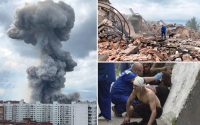Russian hackers post nude photos of US cancer patients to dark web
Ruthless Russian-linked hackers have posted naked photos of cancer patients on the dark web after a Pennsylvania health group refused its ransom demands.
Lehigh Valley Health Network (LVHN) said that three intimate photos of patients receiving radiation oncology treatment were among items posted online by BlackCat — “a ransomware gang associated with Russia.”
“This unconscionable criminal act takes advantage of patients receiving cancer treatment, and LVHN condemns this despicable behavior,” the network told The Post.
The health group said it first “detected unauthorized activity within our IT system” on Feb. 6 and “immediately launched an investigation, engaged leading cybersecurity firms and experts, and notified law enforcement.”

Along with the images, “seven documents containing patient information” were posted, LVHN said.
BlackCat — also known as ALPHV and Carbon Spider and linked to Russian gang REvil — posted threats online ahead of the leak.
“Our blog is followed by a lot of world media, the case will be widely publicized, and will cause significant damage to your business,” the group said in a message shared by security experts.
“Your time is running out. We are ready to unleash our full power on you,” it warned.
It was not immediately clear how much money was demanded by the gang, which has largely targeted US health services since it was first detected in November 2021.
However, in a recent briefing, the Department of Health and Human Services (HHS) recently said BlackCat has “demanded ransoms as high as $1.5M.”
“Affiliates keep 80-90% of the ransom fee,” the government agency said, noting how the gang’s admin was part of REvil.
Dr. Pablo Molina, the chief information security officer for Drexel University, told WPVI that BlackCat is known to “go after hospitals because this is where the money is.”

It created a clear “dilemma,” Molina said, because “we all know that if we pay a ransom they will use that money to in turn conduct more attacks.
“So it’s not only that we’re losing the money, but also we’ll facilitate future attacks.”
It is unclear if the images are still online.


